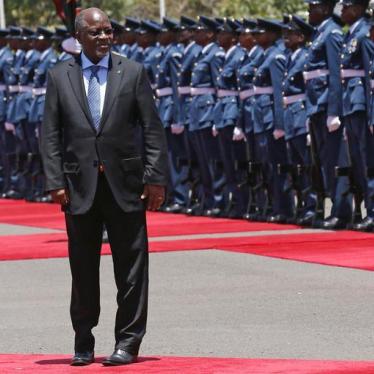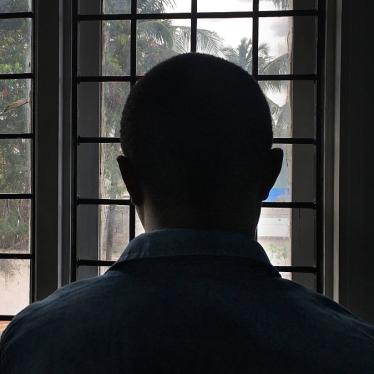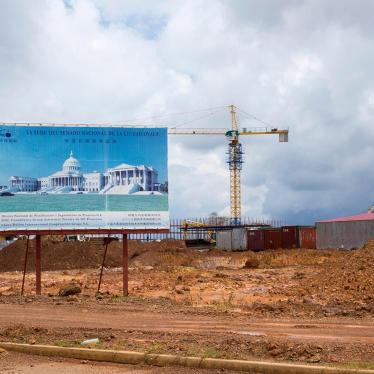May 20,2020
Your Excellency,
Re: Immediate and urgent measures to protect the rights of prison detainees in Tanzania
We the undersigned non-governmental human rights organizations, welcome your government’s measures to halt the spread of COVID-19, including closing schools, discouraging public gatherings, informing the public, and establishing three Cabinet committees to lead the response.
We particularly welcome recent steps to decongest Tanzania’s prisons, where 3,717 prisoners were pardoned in line with recommendations by the World Health Organization (WHO). However, we believe it does not go far enough to alleviate the risk to Tanzania’s prison population and the community at large. Tanzania’s prison conditions make it practically impossible to maintain social-distancing for all detainees and self-isolation for those possibly, or are, infected. Also at risk are prison staff, medical and food service providers, their families, and the communities they interact with. Like many of Tanzania’s regional counterparts, places of detention are overcrowded, have limited access to healthcare, and face hygiene challenges. The WHO has warned that “people deprived of their liberty, and those living or working in enclosed environments in their close proximity, are likely to be more vulnerable to the COVID-19 disease than the general population.” In order to implement strict social distancing, Tanzania’s prison population must be reduced such that the general prison population can maintain at least one meter or greater distance in all directions at all times, in line with current guidelines. In addition, facilities must have enough space to self-isolate those who are ill or have come into contact with infected persons.
On several occasions, your Excellency has noted with concern the overpopulation of Tanzania’s prisons. More than half of the country’s detainees are awaiting trial, many of whom have been detained for years. Effective measures to decongest the country’s prisons need to include releasing many members of this group. As other countries’ experiences show, the failure to take measures to decongest prisons can lead to prison riots In response to COVID-19, and the threat to prison populations, neighboring countries like Uganda, in addition to pardoning certain convicted persons, have undertaken to urgently review cases of pre-trial detainees. In Kenya, by fast-tracking hearings through video conferencing, courts were able to release over 5,000 prisoners, including “remandees”. Given the rising numbers of confirmed COVID-19 cases in Tanzania, extraordinary measures are required.
We therefore call on you to prevail on the relevant authorities to urgently review cases of those in pre-trial detention, including individuals detained on non-bailable offenses and those whose cases are still at the investigation stage. Further, the authorities should refrain from custodial arrests for low- level offenses that do not involve the infliction or threat of infliction of serious bodily injury, sexual assault, or a known likelihood of physical harm. Where the arrest and detention of a person is unavoidable, screening measures must be put in place to prevent the infection of persons in detention as well as members of the police.
While taking immediate measures to decongest the prisons and detention centers as recommended above, we urge your government to ensure that facilities continue to adhere to the United Nations Standard Minimum Rules for the Treatment of Prisoners (Nelson Mandela Rules). Authorities have directed the lockdown of detention facilities to limit interaction with the outside population. This means prisoners are no longer allowed public visitors, including family members and their legal representatives. Restricting lawyers from meeting their clients jeopardizes the fundamental right to legal representation. Furthermore, the complete isolation of prisoners from friends and family may have an impact on the mental well-being of detainees.
We recommend that Tanzania implement alternative measures, such as video conferencing, allow increased phone calls with family and legal representatives, and permit email and communication at a distance or behind glass partitions.
Currently, while measures are in place for courts to continue to hear some criminal matters through video conferencing, there has been no publicized directive or collaboration between the offices of the Prosecutor General, the Judiciary, or the legal profession to prioritize reducing the number of detainees, particularly those in pre-trial detention. The failure to further decongest prisons, coupled with the restrictions of legal counsel and family visits as detailed above, could aggravate what is already a tense, difficult and potentially dangerous situation.
We therefore respectfully urge that you consult with relevant stakeholders, including the Honourable Minister of Health, the Commissioner General of Prisons, the Honourable Chief Justice, the Director of Public Prosecutions, the Inspector General of Prisons, the Tanganyika Law Society, and other civil society organizations, to put in place a comprehensive COVID-19 plan of action to decongest Tanzania’s prisons. These bodies should agree on a plan to do this, which should be shared with all involved, including prison staff, inmates, and the general public, to minimize unnecessary fear and anxiety.
The Tanzanian government has an obligation to ensure the right to health for everyone under its jurisdiction. Article 16 of the African Charter on Human and Peoples' Rights, to which Tanzania is a state party, provides: “Every individual shall have the right to enjoy the best attainable state of physical and mental health.” This right, in accordance with the 1995 African Commission Resolution on Prisons in Africa, is extended to prisoners, detainees, and other persons deprived of their liberty.
In light of the above, the undersigned organizations respectfully recommend that the government of Tanzania urgently take the following measures:
- Review of cases that could lead to release of detainees. Courts should continue to hold all critical hearings, including bail hearings and habeas corpus petition hearings. The prosecution should agree to conditional or unconditional release options, unless individuals are accused of a serious offense and their release would pose a specific and known risk of harm to others or they are a known flight risk. Pending cases not previously scheduled for hearing can be expedited to facilitate early disposition of the case;
- During this COVID-19 period, authorities should refrain from arresting people for crimes that do not involve serious offenses, and then only arrest if the person would pose a specific and known risk of harm to others, issuing citations instead;
- Prisoners who do not meet the criteria for conditional or unconditional release should not be isolated from legal counsel or relatives. Any restrictions on the rights of people deprived of their liberty, including on visitations, should be strictly necessary and proportionate to the health emergency. The government should implement alternatives for prisoners to consult privately with legal counsel, during court proceedings and within prison facilities. Prisoners must also be allowed contact with their relatives, taking into account social-distancing measures. This can include providing free and adequate access to telephone, internet, video communication and other appropriate electronic means, as well as measures to safely receive food and other supplies.
- Ensure that all detention facilities are equipped with sufficient and functioning sanitizing equipment and/or other relevant facilities for physical hygiene and that all detainees are regularly provided (free of charge) with adequate quantities of soap, sanitizing items and access to clean running water.
Thank you for your attention to this critical matter, which bears on the health and well-being of all Tanzanians. We would be happy to talk by phone with officials involved in addressing these issues.
Sincerely,
- Amnesty International
- Anti-Corruption Trust of Southern Africa (ACT-SA) (Zambia)
- CIVICUS. (South Africa)
- Counselling Services Unit (CSU) (Zimbabwe)
- Crime prevention, Rehabilitation and Reintegration of ex-prisoners (CRROA). (Lesotho)
- Crisis in Zimbabwe Coalition (Zimbabwe)
- EG Justice
- Friends of Angola (FoA) (Angola)
- Human Rights Institute of South Africa (HURISA) (South Africa)
- Human Rights Watch
- Institute for Public Policy Analysis and Implementation (IPPAI.) (Zimbabwe)
- Lawyers for Human Rights. (LHR) (South Africa)
- Legal and Human Rights Centre (Tanzania)
- Malawi Network of Religious Leaders Living with or Personally Affected by HIV (MANERELA+). (Malawi)
- Oasis Network for Community Transformation.
- Robert F Kennedy Human Rights (RFK)
- Southern Africa Human Rights Defenders Network (SAHRDN)
- Southern Africa Litigation Centre (SALC) (South Africa)
- Southern Africa Network Against Corruption (SANAC). (Zambia)
- The Rock of Hope (South Africa)
CC:
The Honorable Chief Justice
The Honourable Minister of Constitutional and Legal Affairs
The Director of Public Prosecutions
The Commissioner General of Prisons The Inspector General of Police






